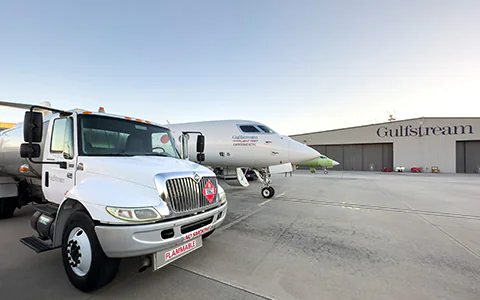Rolls-Royce and Gulfstream Aerospace Corp. are conducting the first original equipment manufacturer test flight of an ultralong-range business jet powered by 100% sustainable aviation fuel (SAF).
The test was performed on the BR725-powered Gulfstream G650 twin jet in Savannah, Georgia, the headquarters of Gulfstream.
This test establishes the framework for advancing this type of fuel towards certification by demonstrating that current Rolls-Royce engines for business jet and large civil applications can operate with 100% SAF as a full “drop-in” option.
All contemporary Rolls-Royce engines can run on SAF, which is currently only certified for blends of up to 50% with conventional jet fuel.
“The SAF that was used in the test consists of two components: HEFA (Hydroprocessed Esters and Fatty Acids), produced from waste fat and waste plant oils by low-carbon fuel specialist World Energy in Paramount, California, and (SAK) Synthesised Aromatic Kerosene made from waste plant-based sugars by Wisconsin-based Virent Inc.,” says the press release.
SAF, which is typically manufactured from waste feedstocks and renewable biomass, may lower emissions by up to 80% compared to conventional jet fuel. Commercial aviation in the United States uses around 10% of all transportation energy and accounts for 2% of the nation’s carbon emissions, Bio.News reported.
“Sustainable aviation fuels are essential for the decarbonization of the skies, as they have the potential to significantly reduce the carbon emissions of aviation and we have already proved they can be used as a drop-in fuel to power existing engines,” said Dr. Joerg Au, Chief Engineer for Business Aviation and Engineering Director at Rolls-Royce Deutschland.
BIO advocates for increased SAF support
The Biotechnology Innovation Organization (BIO) has long advocated for increased SAF support, including tax credits.
BIO members like Gevo, LanzaTech, Velocys, and Virent are working with airlines and the government to increase SAF production, according to Bio.News.
In a letter to U.S. House and Senate leadership earlier this year, a broad coalition of 77 companies and associations in the aviation industry—including the BIO—reiterated calls for “a new, long-term, technology- and feedstock-neutral tax incentive for sustainable aviation fuel.”
“SAF is widely considered the most critical driver of aviation decarbonization, as electrification and other advanced propulsion technologies are currently infeasible for the medium- and long-haul flights that account for the vast majority of aviation’s GHG emissions,” the letter stated.




